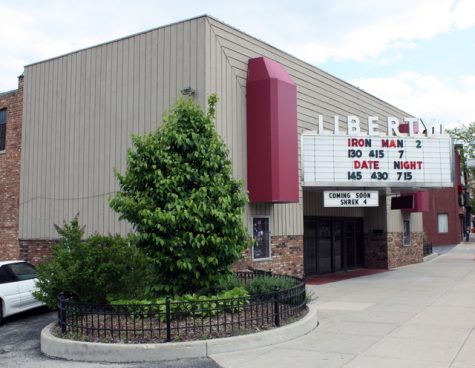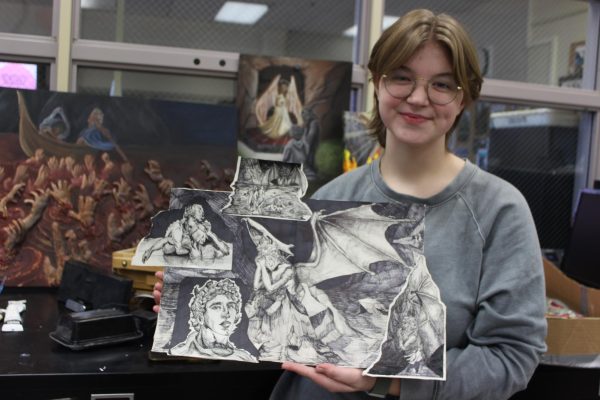The Liberty Theater: A Memorable Past and an Uncertain Future

The Liberty Theater has long been a highlight of downtown Libertyville due to its rustic charm and 82-year history. After years of rumors that The Liberty was going out of business, on Jan. 30, it was revealed that the theater would officially be closing its doors. Although the time for the Liberty Theater has come to an end — for now — it has created many memories for its community.
History
Prior to 1937, downtown Libertyville was lacking an entertainment attraction. However, 64-year-old German immigrant Frederick William Dobe was prepared to change this by financing Libertyville’s first formal movie theater.
After months of construction and anticipation, the Liberty Theater opened to crowds of children and adults on Aug. 27, 1937. Dobe’s new theater was considered very modern for its time. The auditorium of the theater seated exactly 706 people in air-cushioned chairs. To increase safety, the walls were supported with steel columns and beams.
Another one of the theater’s innovative new features was a water-cooled air system, similar to modern-day air conditioning. The system allowed for cooled water to pass through coils within the theater.
A defining characteristic of the theater was its towering, retro-style marquee. The marquee became an emblem for downtown Libertyville until it was eventually taken down in 1955 and replaced with a more traditional one.
Regarding films, the Liberty opened showcasing the Warner Baxter film “Slave Ship.” In the 1940s, the theater would go on to show movies such as “Tycoon” and “Gone with the Wind.” The theater was considered a financial success, as noted by The Independent-Register — a former Libertyville news outlet. At one point, the theater even hosted the world premiere of “Desperate Journey,” a 1942 film about allied soldiers escaping Nazi Germany that featured then-actor Ronald Reagan.
The theater’s popularity at one point even led to the employment of a young Marlon Brando. Brando would, of course, go on to play the titular role in “The Godfather” and, as rumor has it, ride his motorcycle through the original Libertyville High School building. Although he would eventually play a large role in the movie industry, former employee and LHS junior Erin Benton described hearing rumors that “when he worked there, he hated it.” She also said that she heard “he made a mess and quit his job.”
LHS wrestling coach Mr. Dale Eggert, who graduated from LHS and taught at the school for more than 30 years, called the Liberty Theater “the only show in town” and said that “basically everyone went to the Liberty” throughout the 1960s and 1970s.
The theater maintained its rustic and classic appeal throughout multiple generations until it was bought by Scott Dehn in 2012. Dehn, owner of Golden Age Cinemas, installed two new $120,000 digital projectors and hosted a grand re-opening of the theater.
Recent Developments
Dehn announced to his employees in late January that the theater would be closing its doors, effective immediately.
“We were all called in for a meeting on Thursday night, in the last week of January, and we were all told the news at the same time,” said sophomore and former employee Audrey Batesky over email, stating that it was “so odd and didn’t feel real.”
Although the news was unexpected, there had been signs for some time that the theater was struggling financially. Multiple factors contributed to a decline in attendance.
The most influential factor in the closing of the Liberty Theater was the opening of the AMC 12 in Vernon Hills in 2015. Benton noted that before the AMC opened, the Liberty Theater “had hundreds and hundreds of people every night” and “there never really was a no-show.” However, the appeal of the reclining seats and more modern projector technology of the AMC drew many of the crowds that used to flock to the Liberty.
Besides increased competition in the theater market, the power and influence of streaming services has also had an impact on the Liberty and movie business in general. Streaming services such as Netflix, Hulu and Amazon Prime have increased the number of films released exclusively to their services. Senior Mary Wetterling, another former employee of the Liberty, noted that one of the top movies of 2018 “won the most awards and was not even in theaters.” Wetterling was referring to “Roma,” an Alfonso Cuaron film released on Netflix.
Impact
Although the Liberty Theater is closed and may not see its glory days again, its impact on its employees and community cannot be understated. Many of these former employees — the majority of them LHS students — made strong bonds with their co-workers and the theater itself.
Benton feels that the Liberty Theater taught her important lessons about acceptance and kindness. According to Benton, “so many different types of people worked [at the theater], like athletes or theater kids.” She believes that she “would have never thought that the theater would bring [her] closer to so many people,” but she also learned to “be more accepting because of it.”
Employees of the theater often created their own games and special traditions. Batesky recalled that she and other workers would sometimes “crawl through the tunnels below Milwaukee Avenue” and “[play] random games in the lobby with one another.”
Another very common tradition among employees was the hiding of a small toy unicorn in the theater. According to Wetterling, the unicorn “went unfound for years until someone [she] worked with found it.” The employees of the theater then began hiding it after that. Wetterling also noted that it was common for movie posters to be placed in the office and modified to have spoofed versions of their names.
Socially, the theater was a common meeting place for employees and some non-employees as well. Over email, Bateskey noted that some of her special times at the theater “would just be going up onto the roof with staff and friends after the theater closed for the night.”
Benton recalled that some of her favorite memories from the theater were spending time with college students who were former employees at the theater. She believed that the theater allowed her to make such strong friendships with people she may have otherwise not known as well.
The Liberty Theater was also the site of a student-made film known as “Rhys Wick” this past spring. The short film was “a spoof of the popular series John Wick” according to junior and former employee Ty Holzwarth. Holzwarth worked alongside a handful of other junior boys — including Jon O’Hara, Rhys Junas, Jack Regan, and Andrew Clark — to create this film. According to Holzwarth, the creators of the picture “were in the parking lot [of the Liberty Theater] for a lot of it.”
The Liberty Theater was also meaningful to Mr. Eggert and his childhood. Mr. Eggert called the Liberty “a happy place” and that every weekend the theater was “a packed house.” He recalled that he would often go to the theater “once every three weeks, if not, once every two depending on what new show was playing” during the 1970s.
The Future of the Liberty
For now, the Liberty Theater is officially closed for business. The theater’s two poster frames outside the entrance both read “Closed: Thanks for the Memories.” Yet the future of the theater may not be as bleak as it seems.
According to Benton, Dehn has been communicating with “people in Libertyville” and “these people have offers and signed forms to take the theater and [make] it into a different type of theater.” This new theater would be more modern and could feature live performances in a bar-type style. A small stage currently resides behind one of the theater’s screens and could provide for a smooth transition into this new type of theater.
However, no specific decisions have been made and there have also been proposals to demolish the building. Therefore, the future of the Liberty Theater is still very much in the air.
Special Note
The information in the “History” section of this story was found from various historical sources and archives at the Cook Memorial Library.







